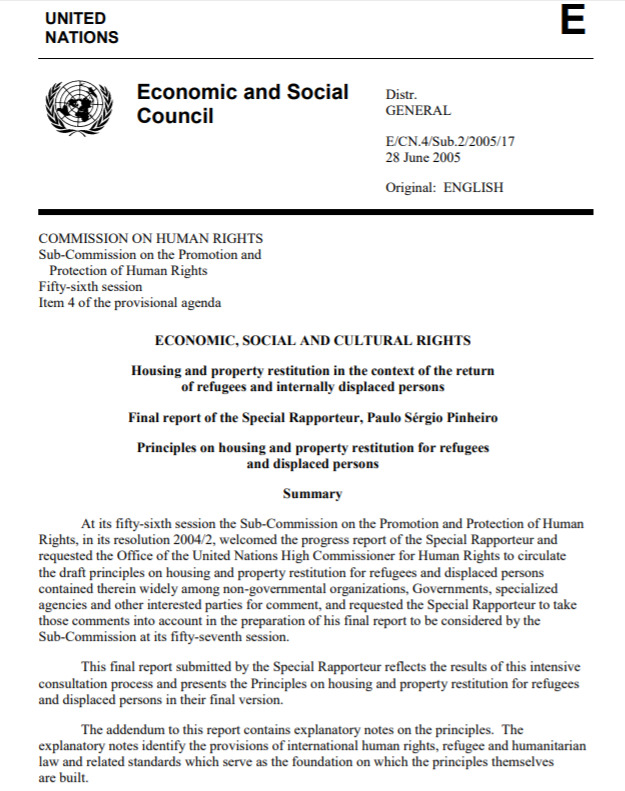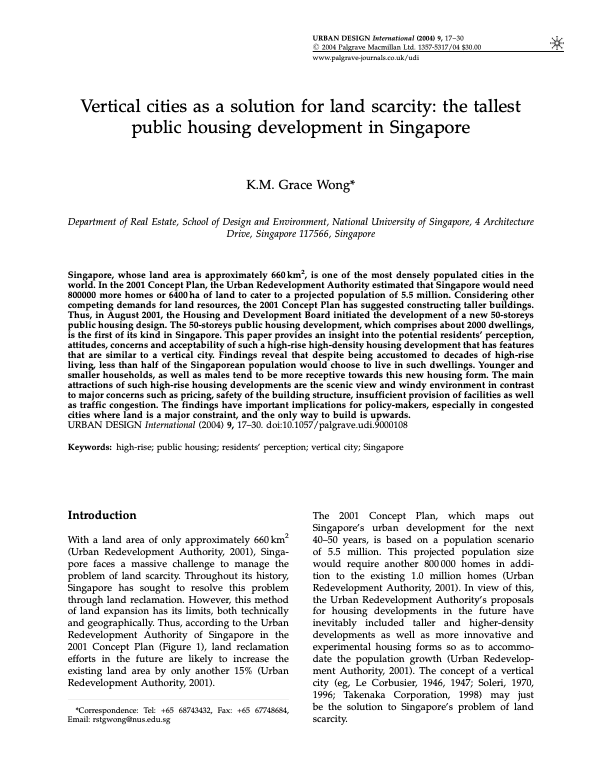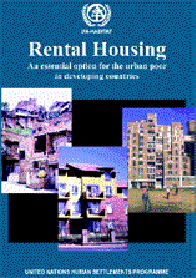Shared Tenure Options for Women: A Global Overview
Provides an overview of different forms of shared tenure, whether between husband and wife, stable partners, extended families, women’s groups or communities. Analyses to what extent they are beneficial to women. Includes a preliminary examination of the impact of shared tenure on women’s effective land and housing rights, on women’s access to credit and on domestic violence. Seeks to contribute to the development of tools and strategies towards women’s security of tenure.
Housing and property restitution in the context of the return of refugees and internally displaced persons
At its fifty-sixth session the Sub-Commission on the Promotion and Protection of Human
Rights, in its resolution 2004/2, welcomed the progress report of the Special Rapporteur and
requested the Office of the United Nations High Commissioner for Human Rights to circulate
the draft principles on housing and property restitution for refugees and displaced persons
contained therein widely among non-governmental organizations, Governments, specialized
agencies and other interested parties for comment, and requested the Special Rapporteur to take
A Place We Want to Call Our Own. A study on land tenure policy and securing housing rights in Namibia?
Chapters cover introduction and background; land tenure; housing; inheritance and marital property legislation; poverty reduction strategy; land management systems; implementation of land and housing rights; good practices; conclusions; recommendations. Argues that the challenge is to take the steps necessary to speed up full implementation of the Flexible Land Tenure System so as to revitalise the hopes and aspirations of the thousands of poor families living in informal settlements.
To Have and to Hold: Women’s Property and Inheritance Rights in the Context of HIV/AIDS in Sub-Saharan Africa
Contains introduction; determinants of property rights and consequences of loss (including country examples from Kenya, Lesotho, Malawi, Namibia, Zambia); policy context: influencing strategies to promote property and housing rights; finding what works: mapping good practice in local and national activities (including legislative frameworks, judicial capacity and litigation, public awareness); lessons and suggested next steps; conclusion; appendices; references.
Vertical cities as a solution for land scarcity: the tallest public housing development in Singapore
Singapore, whose land area is approximately 660km2, is one of the most densely populated cities in the world. In the 2001 Concept Plan, the Urban Redevelopment Authority estimated that Singapore would need 800000 more homes or 6400 ha of land to cater to a projected population of 5.5 million. Considering other competing demands for land resources, the 2001 Concept Plan has suggested constructing taller buildings. Thus, in August 2001, the Housing and Development Board initiated the development of a new 50-storeys public housing design.
Rental Housing: An essential option for the urban poor in developing countries
Demonstrates that most arguments leading to the current bias against rental housing are highly flawed. Argues for more tenure-neutral housing policies, and urges governments to modify regulatory frameworks, develop credit programmes and other forms of assistance to support housing production, with a view to creating more rental housing and to improve the existing stock.
Rights and reality are women's equal rights to land, housing and property implemented in East Africa ?
Rights and reality are women's equal rights to land, housing and property implemented in East Africa ?
Housing and Town Planning Act
This the Belizean housing and town planning act. It is the primary piece of legislation for these topics.
The Architects and Quality Surveyors (Registration) Act
An Act to establish a Board to regulate the conduct of architects, quantity surveyors and architectural and quantity surveying consulting firms, to provide for their registration and for related matters.







